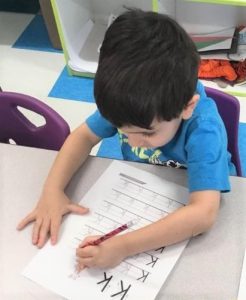Does Your Child Struggle With A Learning Disability?
If your child has a learning disability, you may have noticed some common symptoms. Perhaps they have trouble finishing their homework or struggle with reading comprehension and writing. Or, maybe your child has difficulties in one certain subject such as math or science.
 You may have also noticed your child hasn’t been doing well in the classroom, which may frustrate both your child and their teachers. As a result, it’s possible you’ve started to worry about your child’s prospects for the future and how well they’ll manage college or a job. Any of these can be a sign your child may not be able to process all the information given to them and therefore struggle in school. Some children underperform in a very specific area, such as: dyscalculia (difficulty with math), dysgraphia (difficulty with writing), or a disorder related to written expression or lack of ability to communicate with writing.
You may have also noticed your child hasn’t been doing well in the classroom, which may frustrate both your child and their teachers. As a result, it’s possible you’ve started to worry about your child’s prospects for the future and how well they’ll manage college or a job. Any of these can be a sign your child may not be able to process all the information given to them and therefore struggle in school. Some children underperform in a very specific area, such as: dyscalculia (difficulty with math), dysgraphia (difficulty with writing), or a disorder related to written expression or lack of ability to communicate with writing.
Learning disabilities in children can often leave them feeling frustrated or distressed about their progress, especially if they are actually very smart. This can contribute to lower self-esteem and overall happiness in children, which can leave parents feeling concerned. Whether your child has a specific learning disability or performs below his or her abilities in more than in one area, you can often observe a low motivation when it comes to classroom learning or completion of the homework. So, you may be worried that their difficulties in the classroom could lead to a negative self-view or that their classmates might perceive them as less than.
As a parent, you want what’s best for your child. Right now, you may be watching them struggle and find yourself uncertain about what to do. You just want them to be happy and successful, and you hope to find a way to help them achieve that.
Learning Disabilities Are Much More Common Than People Think

Some children who struggle in school are diagnosed with a learning disability as early as third grade, and others may not be diagnosed at all. In fact, it is estimated that 1 in 5 children have some form of learning disability. Therefore it is a likely possible that, if your child is struggling in school, a learning disability could be a part of your child’s struggles.
One of the causes of learning disabilities relates to an individual’s ability to accurately and readily process certain stimuli. Our cognitive functions start forming when we are in our mother’s womb and continue to develop after we are born. Reading comprehension and other skills can be enhanced when parents read to their children because it helps them better understand vocabulary and how sounds may match the words on a page. When a child has a learning disability, both motor function and auditory processing could be disrupted, which leads to them struggling to truly comprehend what they’re learning, no matter how much parents have exposed the child to regular story-reading early on.
Listening and auditory processing is closely connected to our ability to learn and process information. In fact, a group of studies reported that children with learning disabilities frequently have auditory processing difficulties, which is what often leads to their success and frustration in the classroom.
This does not mean that children with learning disabilities are stuck forever. The brain is incredibly malleable, especially at a young age, and can be trained to better process the information these children receive.
The Tomatis Method Can Help Learning Disability Treatment
Classical intervention for learning disabilities often involves tutoring and visual programs. With diligent practice these methods can considerably help correct some of the behavioral aspects, but may not necessarily address the underlying cause of a child’s struggles. Auditory intervention—developed by Dr. Alfred Tomatis—uses stimulation to train the part of the brain that processes sound, as well as other areas that integrate various sensory-information.
 However, at Dr. Sacarin Listening, Movement and Development Center we believe that addressing both the symptoms and the core problem is utterly important. Therefore, we use a combination of the Tomatis method and classical intervention to assess and treat children, teenagers and young adults who present with learning disabilities.
However, at Dr. Sacarin Listening, Movement and Development Center we believe that addressing both the symptoms and the core problem is utterly important. Therefore, we use a combination of the Tomatis method and classical intervention to assess and treat children, teenagers and young adults who present with learning disabilities.
The first thing we will do is an evaluation. This is both to see if the Tomatis method is the right option for your child and to make sure we can create an effective program moving forward. For example, ADHD symptoms may overlap with learning disability symptoms, so we would want to determine whether the main problem is a learning disability or ADHD.
Once we have determined the origin of the problem, we will discuss the specific issues facing your child and if we can help: create an individualized treatment plan. However, if we think that the challenges your child is facing need to be addressed through different approaches, we immediately provide you with referrals and the explanation for our decision. We will also make recommendations for the next steps after treatment is completed if we find that further development is necessary.
The parents are an integral part of this process. Often children who have learning disabilities struggle with poor self-esteem; throughout the program we guide and consult with parents to work with their children both during and after our sessions. Additionally, we may schedule consultations with teachers in order to better prepare them to help your child.
I have been working with learning disabilities in children and young adults and related issues for most of my professional life. When I received my Master’s degree, I minored in learning disabilities and even my doctoral thesis focused on a controlled research investigating how auditory processing plays a role in multiple areas of learning and how the Tomatis Method could make a significant difference in developing those parameters of learning.
While learning disabilities will often have effects throughout a person’s life, the brain can still be trained in order to lessen the impact of the effects felt over time. I have seen children who were unable to read at all or had been diagnosed with dyscalculia go on to succeed at college. In some children I have seen statistically significant advances in reading comprehension (measured with standardized tests) after completion of only two phases of the Listening Program developed by Dr. Alfred Tomatis. With expert help, your child could change and experience that learning is possible for him- or herself, and therefore live a happier and more fulfilled life.
You may still have reservations about the Tomatis method for learning disability treatment…
I don’t have the time.
The process is not as long as you may think because of our systematic approach. This is not something that will take years of you and your child’s time. It is a compressed approach that will only take a couple of weeks to complete and yet could significantly improve your child’s ability and motivation to learn.
My child has been through other types of intervention. How do I know this one will work?
Auditory processing has been shown to be significantly connected to a child’s ability to learn. One study looked at several different methods used to treat learning disabilities and found that strategies that are based on sound were the most effective at helping children with learning disabilities. Moreover, we incorporate aspects of traditional intervention so that your child can make as many advancements as possible. We will also discuss any other interventions that could help your child and provide referrals if the Tomatis method isn’t right for them.
I’m worried about the cost of learning disability treatment.
Cost is an understandable concern. However, it is important to address learning disabilities sooner rather than later, as they may create an even more negative impact in the future on the child’s self-esteem and confidence that they can learn. We are willing to work with you and evaluate the cost to benefits ratio after each phase of the treatment so that you are always able to decide whether or not to continue pursuing this method.
Your Child Can Manage Their Learning Disabilities
If you would like to learn more about what our approach – which incorporated the Tomatis method – can do for your child, I offer a free 30-minute phone consultation at 206-522-8873. I also offer free monthly, in-person presentations that you can sign up for through either email or phone. The schedule for the Free Monthly Presentations is posted on our website. Through auditory intervention, we can help your child mature their learning functions so that they can feel more successful at school and in life.
